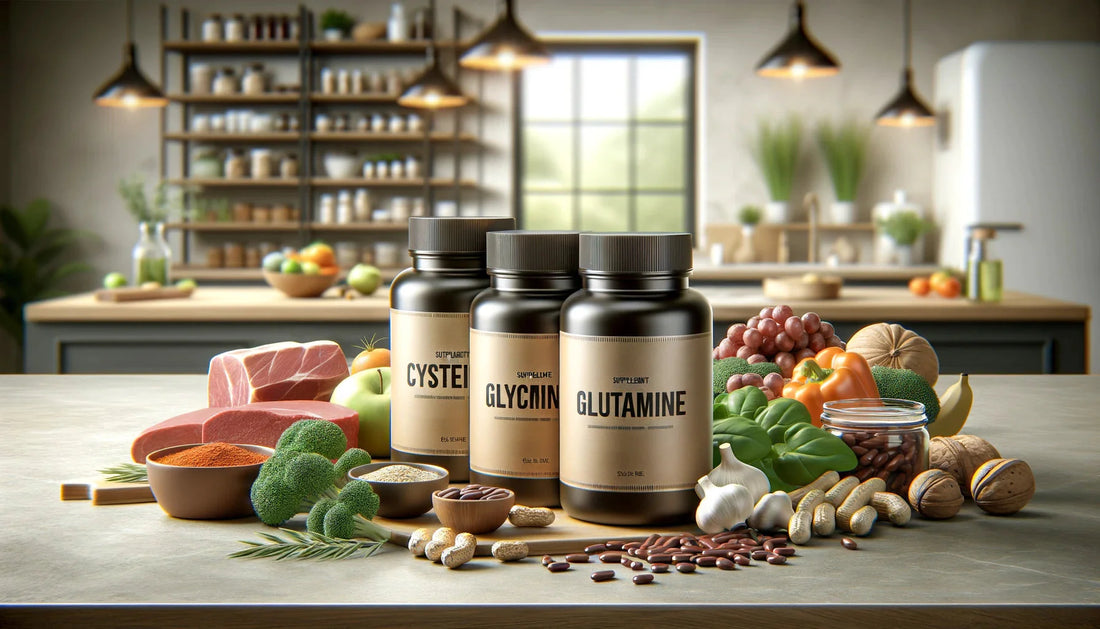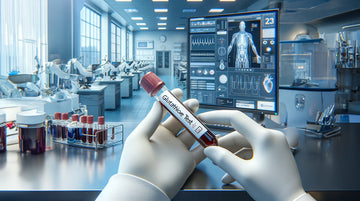

Cysteine, Glycine, and Glutamine Supplement: Boosting Glutathione Naturally
Table of Contents
Glutathione plays a crucial role in maintaining overall health and well-being by neutralizing harmful substances in the body.
In this blog post, we will explore the science behind glutathione synthesis and its importance in the body. We will take an in-depth look at how cysteine, glycine, and glutamine contribute to boosting glutathione levels naturally.
If you're looking to improve your overall health naturally, read on!

What is Glutathione and its Role in the Body
Glutathione, an essential compound, safeguards cells from oxidative stress and supports immune function and detoxification. Its ability to counteract free radicals and oxidative damage is crucial for overall health. As GSH levels decline with age, supplementation becomes increasingly vital. The concentration of GSH significantly influences health and the aging process. This makes it important to understand how glutathione works in the body and its impact on overall well-being.
The Importance of Glutathione in Health (Check here)
The Process of Glutathione Synthesis
The synthesis of glutathione involves combining amino acids to form this essential antioxidant. Glutamine, glycine, and cysteine act as precursors for glutathione synthesis, contributing to its production in the body. The process includes GSH synthesis and the regulation of GSH levels to maintain balance. This synthesis is crucial for supporting immune function and overall well-being, as glutathione helps protect the body from oxidative damage and age-related decline. Additionally, reactive oxygen species have an impact on glutathione synthesis and overall body mass.
Glutathione Precursors: Cysteine, Glycine, and Glutamine Supplement
Glutathione is a powerful antioxidant that our bodies naturally produce. It helps protect our cells from damage caused by harmful molecules called free radicals. Glutathione precursors are substances that our body uses to make glutathione. These precursors include three important amino acids: cysteine, glycine, and glutamine.
Cysteine
This amino acid is crucial for creating glutathione. It contains a component called sulfhydryl (-SH) group, which is essential for forming the structure of glutathione. Cysteine is not always abundantly available in the body, so having enough of it is important for producing adequate glutathione levels.
Glycine
Another amino acid required for glutathione production is glycine. It plays a role in combining with cysteine and glutamine to form the glutathione molecule. Glycine is commonly found in many protein-containing foods like meat, fish, dairy, and legumes.
Glutamine
Glutamine is an amino acid that also contributes to glutathione synthesis. It helps in maintaining the levels of other amino acids, including cysteine, which is a key building block for glutathione production. Glutamine-rich foods include protein sources like beef, chicken, fish, dairy products, and certain vegetables.
When we consume foods containing these amino acids (cysteine, glycine, and glutamine), our body uses them to create glutathione. Having a balanced diet that includes these amino acid-rich foods can support the body's natural ability to produce glutathione, which in turn helps in maintaining good health by protecting our cells from damage caused by oxidative stress and free radicals.

Other Supplements That Support Glutathione Synthesis
In addition to the amino acids cysteine, glycine, and glutamine, several other supplements and nutrients can support glutathione synthesis in the body:
N-acetylcysteine (NAC)
This is a more stable form of cysteine and is commonly used as a supplement. It's a powerful precursor to glutathione and helps boost its levels in the body.
Alpha-Lipoic Acid (ALA)
ALA is an antioxidant that helps recycle glutathione, allowing it to remain active in the body for longer periods. It also supports the regeneration of other antioxidants, indirectly aiding glutathione function.
Selenium
This mineral is crucial for the activity of an enzyme involved in glutathione metabolism. Selenium deficiency can limit the body's ability to produce glutathione.
Milk Thistle (Silymarin)
Known for its liver-supporting properties, milk thistle can help increase glutathione levels by aiding in liver detoxification processes.
Vitamin C and Vitamin E
Both vitamins are powerful antioxidants that work synergistically with glutathione. Vitamin C helps recycle glutathione, while Vitamin E protects cell membranes and enhances glutathione's antioxidant activity.
Methylation Enhancers (e.g., methyl donors like SAM-e, betaine)
These compounds help in the methylation process, which is important for the synthesis and recycling of glutathione.
The Impact of Glutathione on Athletic Performance
Glutathione's significant role in athletic recovery and performance is undeniable, as its levels can directly influence an athlete's well-being and ability to perform.
Supplementation with glutathione may offer vital support for athletic performance, making it a crucial factor in an athlete's overall fitness and recovery. Understanding the implications of glutathione's role in enhancing athletic performance is imperative for athletes aiming to optimize their physical capabilities.
The potential benefits of glutathione supplementation extend to its ability to positively impact an athlete's recovery process, contributing to improved performance and well-being.
Key Considerations Before Starting Glutathione Supplementation
Consideration |
Description |
Consult a Healthcare Professional |
Seek advice from a healthcare provider before starting any supplementation. |
Quality and Source |
Choose a reputable brand with certifications and third-party testing for purity and potency. |
Form of Glutathione |
Decide on the appropriate form (oral, IV, topical) based on absorption rate and efficacy. |
Dosage |
Determine the suitable dosage with guidance from your healthcare provider. |
Possible Interactions |
Check for potential interactions with medications or other supplements. |
Health Conditions |
Consider specific health conditions that may benefit from glutathione supplementation. |
Side Effects |
Monitor for potential side effects such as abdominal discomfort or allergic reactions. |
Duration of Use |
Decide whether supplementation is for short-term or long-term use based on individual needs. |
Lifestyle Factors |
Recognize lifestyle factors impacting glutathione levels, such as diet, exercise, and exposure to toxins or pollutants. |
Let’s Sum Up
In conclusion, boosting glutathione levels naturally can have a profound impact on overall health and well-being. Glutathione, often referred to as the body's master antioxidant, plays a crucial role in protecting cells from damage, supporting immune function, and detoxifying harmful substances.
By incorporating glutathione precursors like cysteine, glycine, and glutamine into your diet or through supplementation, you can help enhance your body's natural production of this vital antioxidant.
However, it's important to note that before starting any supplementation regimen, it's crucial to consult with a healthcare professional to ensure safety and efficacy.


















